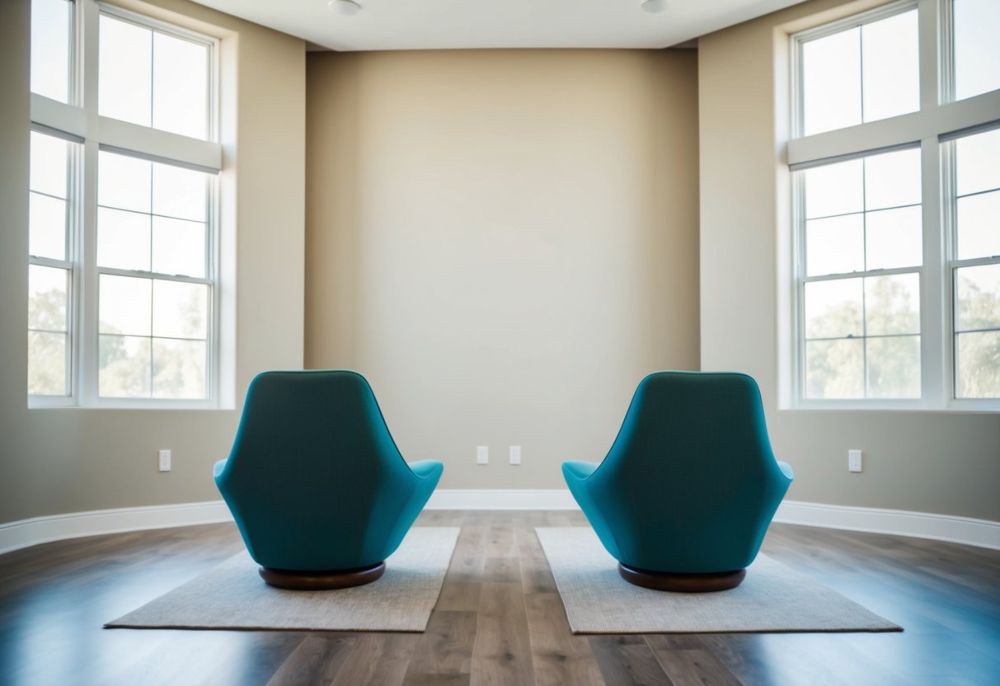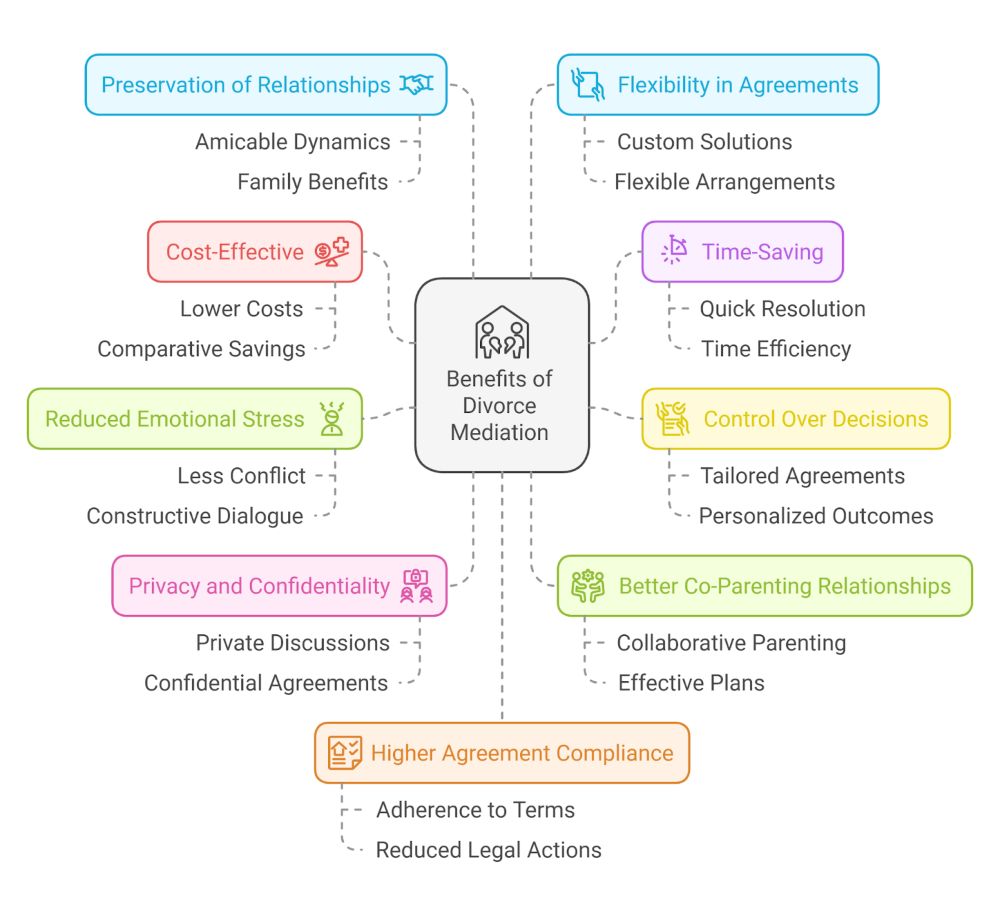
Avoiding Courtroom Battles in 2025: The Benefits of Divorce Mediation for Florida Couples

Divorce can be a difficult and stressful process for couples in Florida. Many people think going to court is the only way to end a marriage. But there’s another option that can make things easier.
Divorce mediation offers Florida couples a way to avoid courtroom battles in 2025. It allows spouses to reach agreements with the help of a neutral third party, which can save time and money compared to going to trial.
Mediation has many benefits for divorcing couples. It gives them more control over the outcome, reduces stress, and keeps things private. For parents, mediation may lead to better co-parenting relationships after the divorce.
Key Takeaways
- Mediation offers a less stressful alternative to courtroom divorce proceedings.
- Couples can save time and money through the mediation process.
- Mediation allows for more control and privacy in divorce agreements.
The Current State of Divorce in Florida
Divorce rates in Florida have changed over time. The process can be tough on couples and families. Money problems often come with splitting up. Let’s look at the numbers and what divorce means for people in Florida.
Statistics On Divorce Rates In Florida
Florida’s divorce rate has been declining over the past decade, aligning with national trends. In 2022, the state recorded 3.1 divorces per 1,000 inhabitants, down from 6.3 per 1,000 in 1990.
Despite this decline, Florida’s divorce rate remains among the highest in the United States. In 2021, the state had a divorce rate of 3.4 per 1,000 female residents aged 15 and older, placing it in the top ten nationwide.
Young couples and those married for a short time are more likely to split up. Second and third marriages have even higher divorce rates.
Money troubles and not getting along are the top reasons for divorce. Kids can make couples stay together longer but don’t always prevent a split.
Traditional Litigation Process And Its Drawbacks
Going to court for divorce can be hard. It often takes a long time and costs a lot. Lawyers charge high fees, and court costs add up fast.
Divorce litigation in Florida can be very stressful. Couples fight over kids, money, and stuff. This can make everyone upset and angry.
The process can drag on for months or even years. This makes it hard to move on with life. It can also hurt the kids caught in the middle.
Economic Impact Of Divorce On Individuals And Families
Divorce hits wallets hard. Splitting one household into two costs more. Both people need their own place to live and things for the house.
Lawyer fees can be very high. Some people spend their savings or go into debt, making it hard to start over after a divorce.
Kids often feel the money pinch, too. There’s less cash for school, activities, and fun stuff. This can affect their future chances.
Understanding Divorce Mediation

Divorce mediation is a method where a neutral third party helps divorcing couples settle disputes outside of court. The mediator guides discussions but doesn’t make decisions for the couple.
In Florida, couples often choose mediation to resolve property division, alimony, and child custody issues. The process typically involves several meetings where both parties share their concerns and work towards solutions.
Mediators create a safe space for open dialogue. They help couples find common ground and develop mutually agreeable terms for their divorce.
Key Differences Between Mediation And Litigation
Mediation differs from litigation in several important ways. It’s usually faster and more cost-effective than going to court. Couples have more control over the outcome of mediation.
In litigation, a judge makes the final decision. In mediation, the couple makes their own choices with guidance from the mediator, which often leads to more satisfying results for both parties.
Mediation is also more private than court proceedings. Discussions stay confidential, which can be especially important for high-profile cases or sensitive family matters.
Role Of A Mediator In Facilitating Agreements
Like Joni Mathis in St. Augustine, a skilled mediator is crucial in the divorce process. They remain neutral and don’t take sides. Instead, they help both spouses express their needs and concerns.
Mediators use various techniques to promote understanding between parties. They might reframe issues, ask clarifying questions, or suggest creative solutions. They aim to help the couple reach fair agreements on all aspects of their divorce.
Peacemaker Mediation Group services often include educating couples about Florida divorce laws. This helps ensure any agreements made are legally sound and likely to be approved by the court.
Feeling stuck in a drawn-out legal battle? Discover how Peacemaker Mediation Group can simplify divorce with affordable, compassionate solutions with mediation tailored to your family’s needs. Contact us now.
If you’re ready to get started, call us now!
Benefits of Divorce Mediation for Florida Couples

Cost-Effectiveness Of Mediation
Divorce mediation offers significant financial advantages for couples in Florida. It provides a more affordable path to separation while preserving important relationships and assets.
Mediation is often much cheaper than going to court. The average cost of divorce mediation in Florida ranges from $3,000 to $8,000. In contrast, litigation can cost $15,000 to $30,000 or more per spouse.
Mediation usually takes 3-4 sessions over 1-2 months. Court battles can drag on for 6-18 months. This extra time means more legal fees and stress.
Mediators typically charge $200-$500 per hour, while lawyers for litigation often bill $300- $500+ hourly. With mediation, couples share the cost of one neutral party instead of paying for two opposing attorneys.
Breakdown Of Potential Savings
Cost-effective divorce in St. Augustine can save couples thousands. Here’s a breakdown of potential savings:
- Court fees: $300-$500 (avoided with mediation)
- Expert witnesses: $1,500-$5,000+ per expert (rarely needed in mediation)
- Depositions: $1,000-$3,000 each (not used in mediation)
- Document preparation: $3,000-$5,000 (reduced in mediation)
Mediation also saves on indirect costs like time off work, childcare, and travel expenses for multiple court appearances.
Long-Term Financial Benefits For Both Parties
The financial advantages of mediation extend beyond the divorce process. Couples who mediate often reach more sustainable agreements, reducing future conflicts and legal costs.
Mediated settlements tend to have higher compliance rates. This means less money spent on enforcement actions later.
Mediation helps preserve assets by avoiding lengthy legal battles that drain resources. This leaves both parties in a better financial position post-divorce.
During mediation, couples learn valuable communication skills. These skills can prevent costly disputes over child-rearing or financial matters in the future.
Time Efficiency
Divorce mediation offers a faster path to resolution than traditional litigation. Through this collaborative process, couples can save valuable time and move forward with their lives more quickly.
Average Duration Of Mediated Divorces Vs. Litigated Divorces
Mediated divorces typically resolve faster than those that go through the court system. Mediation often concludes within a few sessions, while a litigated divorce can take months or even years. In Florida, couples may finalize their divorce in as little as 3-4 months through mediation.
Court schedules are often backlogged, causing delays in litigated divorces. Mediation allows couples to set their own timeline and work at a pace that suits them. This flexibility can lead to quicker resolutions, especially when both parties are motivated to reach an agreement.
How Mediation Can Expedite The Divorce Process
Mediation streamlines the divorce process by fostering direct communication between spouses. A skilled mediator guides discussions, helping couples focus on key issues and find mutually acceptable solutions. This targeted approach can significantly reduce the time spent on negotiations.
Mediation also eliminates many time-consuming court procedures. Couples avoid lengthy discovery processes, multiple hearings, and trial preparations. Instead, they work together to gather necessary information and make decisions efficiently.
Benefits Of A Faster Resolution For Moving On With Life
Mediation allows for a quicker divorce resolution, allowing individuals to start their new chapters sooner. Couples can begin to heal emotionally and focus on personal growth without the prolonged stress of ongoing legal battles.
Faster resolutions also benefit children involved in the divorce. They can adjust to new family dynamics more quickly, reducing the uncertainty and anxiety often associated with lengthy court proceedings.
From a practical standpoint, a speedier divorce process enables individuals to make important life decisions sooner. They can move forward with career changes, relocations, or new relationships without the constraints of a pending divorce.
Reduced Emotional Stress
Divorce mediation offers a gentler path for couples ending their marriage. It helps lower stress and anxiety compared to going to court.
How Mediation Creates A Less Adversarial Environment
Mediation encourages teamwork instead of fighting. Couples sit down with a neutral person to talk things out. This setup helps people stay calmer and more open-minded.
In court, lawyers often take sides and argue. But in mediation, everyone works together to find solutions, making the whole process less stressful.
Divorce mediation reduces emotional stress by promoting understanding between partners. Partners can express their needs without feeling attacked, and this approach often leads to better outcomes for both parties.
The Impact Of A Neutral Setting On Communication
A neutral place for talks can make a big difference. Mediators create a safe space where both people feel heard.
In this calm setting, couples often find it easier to speak up. They can share their thoughts without fear of judgment, and this open talk often leads to a clearer understanding.
The mediator helps keep conversations on track by ensuring that both sides have a chance to speak. This fair approach reduces tension and makes problem-solving easier.
If you’re ready to get started, call us now!
Greater Control Over Outcomes
Divorce mediation gives couples more control over their separation terms. Instead of having a judge decide for them, it allows them to make decisions that fit their unique situation.
How Mediation Allows Couples To Craft Their Own Solutions
In mediation, couples work together to find answers. They can talk about what matters most to them and their family. This process helps them make agreements that work for both sides.
A mediator guides the talks but doesn’t make choices for the couple. For example, they can discuss how to split money or share time with the kids.
Couples often feel better about the results because they helped create them. This can lead to plans that last longer and cause fewer fights later on.
Flexibility In Addressing Both Legal And Non-Legal Issues
Mediation can cover more than just what the law says. Couples can talk about feelings and personal concerns, too. This helps deal with the whole picture of their lives.
They might discuss how to handle holidays or family events after the divorce. Or they could plan how to tell their kids about the changes.
These talks can lead to better co-parenting after divorce. They help parents work as a team even though they’re no longer together.
Comparison With Court-Imposed Decisions
Court cases often end with a judge making all the big choices. This can leave both parties feeling lost, as the judge might not know all the details that matter to the family.
In mediation, couples have more chances to explain what they need. They can try different ideas until they find one that works.
Court decisions might not fit well with a family’s daily life. However, mediated agreements are often more practical because the couple knows their own situation best.
Improved Co-Parenting Relationships
Divorce mediation helps parents strengthen their co-parenting bonds. It promotes open dialogue and prioritizes children’s needs, leading to more stable family dynamics after divorce.
How Mediation Fosters Better Communication
Mediation creates a safe space for parents to talk openly. A neutral mediator guides discussions, helping parents express concerns and find common ground. This process teaches valuable communication skills that last beyond the mediation room.
Parents learn to listen actively and respond calmly. They practice addressing conflicts constructively, setting the stage for better co-parenting. Mediation encourages parents to focus on their children’s needs rather than past grievances.
These improved communication skills help parents handle future challenges. They can more effectively discuss school events, health issues, and schedule changes, which leads to less stress for everyone involved.
Benefits Of Creating Mutually Agreeable Parenting Plans
Collaborative parenting plans are a key outcome of mediation. Parents work together to create schedules and rules that fit their family’s unique needs. This approach increases buy-in from both parties.
Mediated plans often include:
- Flexible visitation schedules
- Clear decision-making processes
- Agreed-upon methods for handling disputes
These plans reduce future conflicts and court visits. They also adapt more easily as children grow and family circumstances change.
Parents who create plans together are more likely to follow them. This consistency provides stability for children during a challenging time.
Long-Term Positive Effects On Children Of Divorcing Parents
Children greatly benefit when parents choose mediation. They see adults working together to solve problems, which models healthy conflict resolution and communication.
Child-focused mediation helps parents prioritize their kids’ emotional needs. It reduces exposure to parental conflict, which can harm children’s development.
Long-term benefits for children include:
- Lower stress levels
- Better relationships with both parents
- Improved emotional well-being
- Higher self-esteem
Children of mediated divorces often adjust more quickly to new family dynamics. They feel more secure knowing their parents can cooperate despite the separation.
Confidentiality And Privacy
Divorce mediation offers a private way to end a marriage. It keeps personal details out of public records and protects sensitive information. This can be very helpful for many couples.
How Mediation Keeps Personal Matters Out Of Public Court Records
Divorce mediation maintains privacy by keeping discussions confidential. Unlike court cases, mediation talks don’t become public records.
The mediator must keep all information private. This includes:
- Financial details
- Personal issues
- Discussions about children
Couples can speak freely without fear of public exposure. They can work out issues in a safe space.
Mediation agreements are private, too. Only the final settlement goes to court. This protects the couple’s personal matters from becoming public knowledge.
Benefits Of Confidentiality For High-Profile Individuals Or Sensitive Situations
Privacy in mediation is crucial for people in the public eye. It helps them avoid unwanted attention during difficult times.
For high-profile couples, mediation offers:
- Protection from media scrutiny
- Control over what information gets out
- A chance to settle quietly
Sensitive situations also benefit. This includes cases with:
- Domestic violence issues
- Business secrets
- Family matters
Mediation lets these couples solve problems without public exposure. It keeps their personal struggles private.
Comparison With The Public Nature Of Court Proceedings
Court divorces are very different from mediation when it comes to privacy. In court, proceedings become public records. Anyone can access the details of the case.
Public court records can include:
- Financial statements
- Accusations made by either party
- Witness testimonies
This lack of privacy can be stressful. It can also damage reputations or businesses.
Mediation avoids these issues. It also keeps the divorce process confidential. Only the final agreement goes to court, protecting the couple’s privacy throughout the process.
If you’re ready to get started, call us now!
Customized Solutions
Divorce mediation allows couples to craft unique agreements tailored to their specific situation. This process leads to more satisfying outcomes that address each family’s needs.
How Mediation Allows For Creative Problem-Solving
In mediation, couples are free to think creatively and explore options that may not be available in court. A neutral mediator helps them brainstorm ideas and find common ground.
This flexible approach lets couples address unique concerns. For example, they might create a plan for sharing family heirlooms or pets. These issues often fall outside standard court procedures.
Mediators encourage open communication, which helps couples uncover their underlying interests and goals. By focusing on these, they can develop solutions that work for everyone involved.
Examples Of Unique Solutions Not Typically Available In Court
Mediation can lead to creative arrangements that courts rarely consider. For instance, couples might agree to:
- Keep the family home until children graduate high school
- Share vacation properties on alternating years
- Create a college savings plan funded by both parents
- Develop a flexible custody schedule for children’s activities
These solutions address specific family needs. They go beyond typical court-ordered arrangements, which often follow set formulas.
Mediation also allows for more detailed parenting plans. Parents can outline how they’ll handle holidays, school events, and extracurricular activities.
Preservation Of Relationships
Divorce mediation offers a path to maintain positive connections between ex-spouses and their families. This approach can help couples navigate the end of their marriage while keeping important relationships intact.
How Mediation Can Maintain Amicable Relationships Post-Divorce
Mediation creates a cooperative environment. Both parties work together to find mutual solutions, which helps reduce the anger and resentment that often arise in courtroom battles.
In mediation, couples learn to communicate effectively. They practice active listening and problem-solving skills. These tools can be useful long after the divorce is finalized.
Mediators encourage empathy and understanding between spouses. This can lead to more compassionate interactions in the future. Ex-partners may find it easier to attend family events or co-parent without tension.
Benefits For Extended Family Dynamics
Divorce affects more than just the couple. It also impacts parents, siblings, and in-laws. Mediation can help preserve these important family ties.
When couples choose mediation, they often:
- Reduce family stress and anxiety
- Keep extended family relationships intact
- Avoid forcing relatives to “choose sides.”
Amicable divorce solutions through mediation can help maintain holiday traditions and family gatherings. This continuity is especially important for grandparents who want to stay connected with their grandchildren.
Positive Impact On Future Interactions, Especially With Children Involved
Preserving a civil relationship is crucial for parents. Mediation helps them prioritize their children’s needs over their conflicts.
Benefits of mediation for co-parenting include:
- Improved communication skills
- Agreed-upon parenting plans
- Flexibility in decision-making
Children benefit when their parents can work together. They will feel less stress and anxiety about the divorce. Kids see a model of respectful problem-solving, which can positively shape their future relationships.
Mediation allows parents to raise their children in a unified manner. This consistency helps kids feel secure during challenging times and makes future events like graduations and weddings more comfortable for everyone involved.
Conclusion
Divorce mediation offers Florida couples a better way to end their marriage in 2025. It helps them avoid stressful court battles and work together instead.
Mediation costs less money than going to court. Couples can save thousands of dollars by choosing this option.
The process is also faster and more private. Mediators help spouses talk through issues calmly and find solutions that benefit both parties.
Children often do better when parents use mediation. It teaches moms and dads how to cooperate and make plans as a team.
Mediation gives couples more control over decisions about their family and future. They can make choices that fit their unique situation.
Many people feel less angry and upset after mediation compared to court fights, which can help them move forward more positively.
Take control of your divorce process with Peacemaker Mediation Group. Reach fair, private, and lasting agreements through contested divorce mediation. Start your journey toward a peaceful resolution today.
Contact Us Today For An Appointment
Frequently Asked Questions
What are the emotional advantages of selecting mediation over litigation for divorcing couples?
Mediation helps reduce conflict between spouses. It creates a calm environment for discussions, and couples can work together to find solutions. This peaceful approach can ease emotional stress.
Mediation also gives couples more control over decisions. Couples can address their unique needs and concerns, which often leads to better outcomes and less resentment.
How can divorce mediation be beneficial in terms of time and financial resources?
Mediation is usually faster than going to court. Couples can set their own schedule and pace. This flexibility can speed up the divorce process.
It’s also more affordable than litigation. Legal fees are often lower, and couples share the cost of one mediator instead of paying two lawyers.
What circumstances might make mediation an inadvisable method for divorce resolution?
Mediation may not work well if there’s a history of abuse or violence. It requires both parties to feel safe and able to speak freely.
Mediation might be ineffective if one spouse hides assets or is dishonest. Full disclosure is key to fair agreements.
What qualifications should individuals seek when choosing a mediator for their divorce proceedings?
Look for a mediator with formal training in divorce mediation. They should have understanding with Florida divorce laws.
Good mediators are neutral and unbiased. They should also have strong communication skills and professional certifications or memberships in mediation organizations.
How does divorce mediation accommodate parents and children’s needs in Florida?
Mediators help parents create parenting plans. These plans cover custody, visitation, and decision-making for children.
Florida courts often require mediation for child-related issues. This process allows parents to focus on their children’s best interests.
What legal protections are provided during mediation to ensure both parties are treated fairly?
Mediators must remain neutral and cannot give legal advice. However, each spouse can have their own lawyer review the agreements.
Mediation discussions are confidential, protecting both parties’ privacy. A judge must approve any agreement reached to make it legally binding.




